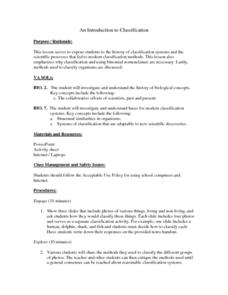Virginia Department of Education
Classification of Organisms
Searching for the perfect indoor/outdoor activity that allows class members the opportunity to learn about organism classification? Here, pupils research organisms and categorize them according to domain and kingdom over the course of...
Curated OER
Systematics and the Phylogenetic Revolution
This assignment conducts a thorough exploration of systematics. Clearly designed for an AP biology course, questions pertain to taxonomic categories, phylogeny, and construction of cladograms.
Curated OER
Taxonomy - The Science of Naming Organisms
Carolus Linnaeus designed the binomial nomenclature system of naming organisms that is still in use more than 200 years later. By viewing this PowerPoint, upcoming biologists learn how to use it. They are also introduced to the hierarchy...
Curated OER
Taxonomy
Biology novices name the seven levels of classification and use binomial nomenclature for naming living organisms. The first half of this presentation bestows a brief history of taxonomy, while the second half instructs on how to use our...
Curated OER
From Curiosity Cabinet to Museum Collection
Learners study binomial nomenclature and museum-based research. They create a curiosity box, label the objects in their curiosity box , develop a classification scheme for the objects, and create a database of all objects collected by...
Curated OER
What's the Difference?
Young scholars analyze the similarities in different species. This instructional activity is part of a multi-segmented unit on the diversity of life. In this segment, students classify shoes to mimic the scientific categories of the...
Curated OER
How Plants are Named
Genus and species are the 2 categories from which the plant classifications are derived and combined to create a scientific name. The rules for capitalization and underlining are given in these clean and logical slides.
Curated OER
What's Your Genus? Scientific Classification and the VT
Students understand the definition of binomial nomenclature. In this binomial nomenclature lesson, students classify ordinary animals by seeking their scientific names. Students participate in a knowledge hunt using binomial nomenclature.
Curated OER
Classification
In this classification worksheet, students complete a word search puzzle by finding 12 words associated with taxonomy and classification.
Curated OER
Classification of Life
In this classification of life worksheet, students use an on line source to answer questions about how species are classified, named and grouped. They give the classification of a bear, an orchid and a sea cucumber.
Curated OER
Classification and Binomial Nomenclature
Students practice identifying different groups of living organisms using a dichotomous key. Students also examine the history of an organism and its lineage by writing a paragraph about it and "three generations" of ancestors.
Curated OER
Classifying Critters
In this classifying critters worksheet, students read a 1 page article on classifying living organisms and then answer 10 true or false, short answer, multiple choice or fill in the blank questions.
Curated OER
Organizing Life
For this classification worksheet, learners will review vocabulary words associated with the organization of living things which includes kingdom, phylum, class, order, family, genus, and species. This worksheet has 5 fill in the blank...
Curated OER
Classification
In this classification worksheet, learners will look at how biological classification began and how scientific names are used in biology. Students will use a table showing the classification of four organisms to answer 10 short answer...
Curated OER
An Introduction to Classification
Sixth graders explore, analyze and study the history of classification systems and the scientific processes that influenced modern classification methods. They evaluate why classification and binomial nomenclature are necessary to the...
Curated OER
Classy
Students explore the classification system in this seven lessons unit. The diversity of life forms and their characteristics are examined using a microscope. Kingdoms, classes, and families are investigated.
Curated OER
Everything in Its Place: Science Classification
Students investigate the system of classification for living things through the sixteen lessons of this unit. The five kingdoms of monerans, protists, fungi, plants, and animals form the basis of several experiments as the similarities...
Curated OER
Classification of Living Things
Pupils classify organisms according to the rules of taxonomy. In this biology lesson plan, students name organisms using binomial nomenclature. They create a new organism and explain which specific group it belongs to and why.
Curated OER
Goals of the Diversity of Life Unit
Students are introduced to the unit on the importance of diversity of life and the role that interdependence plays in our worlds. this is part of a multi-lesson unit on the diversity of life.
Curated OER
What is Diversity of Life?
Students are introduced to the variety of organisms in our world. this lesson is a part of a multi-segmented unit on specie diversity. this segment explores distribution of life on land and sea.
Curated OER
Kingdom Animalia
Students are introduced to the basic characteristics of the animal kingdom. this activity is part of a multi-segmented unit on the diversity of life. In this segment, students explore the the members of a few phyla of the animal kingdom.
Curated OER
Tackling Taxonomy
Students study physical characteristics of separate phyla and place them into similar groups. This lesson is part of a multi-segmented unit on the diversity of life. students develop a classification system by grouping animals into...
Curated OER
Creative Classification
Students create an animal by using physical characteristics to classify that animal in the Linnaean Classification System. This lesson is part of a multi-segmented unit on the diversity of life.
Curated OER
Missing Links
Students change one animal group into another animal group by changing only a few body characteristics. This lesson plan is part of a multi-segmented unit on the diversity of life. In this session, students the basis of classification.

























